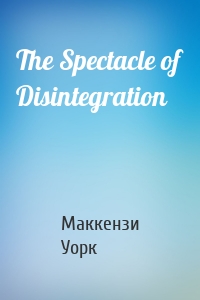Маккензи Уорк
6 кн.
Я очень тебя хочу. Переписка 1995–1...
Кэти Акер и Маккензи Уорк встретились в 1995 году во время тура Акер по Австралии. Между ними завязался мимолетный роман, а затем – двухнедельная возбужденная переписка. В их имейлах – отблески прозрений, слухов, секса и размышлений о культуре. Они пишут в исступлении, несколько раз в день. Их письма встречаются где-то на линии перемены даты, сами становясь объектом анализа. Итог этих писем – каталог того, как два неординарных писателя соблазняют друг друга сквозь 7500 миль авиапространства,...
| Автор | Маккензи Уорк |
Sensoria
As we face the compounded crises of late capitalism, environmental catastrophe and technological transformation, who are the thinkers and the ideas who will allow us to understand the world we live in? McKenzie Wark surveys three areas at the cutting edge of current critical thinking: design, environment, technology and introduces us to the thinking of nineteen major writers. Each chapter is a concise account of an individual thinker, providing useful context and connections to the work of the...
| Автор | Маккензи Уорк |
The Spectacle of Disintegration
Acclaimed author follows the work of the Situationist International after May 1968. Following his acclaimed history of the Situationist International up until the late sixties, The Beach Beneath the Street, McKenzie Wark returns with a companion volume which puts the late work of the Situationists in a broader and deeper context, charting their contemporary relevance and their deep critique of modernity. Wark builds on their work to map the historical stages of the society of the spectacle,...
| Автор | Маккензи Уорк |
The Beach Beneath the Street
The acclaimed, readable history of the Situationist International by the author of A Hacker Manifesto Over fifty years after the Situationist International appeared, its legacy continues to inspire activists, artists and theorists around the world. Such a legend has accrued to this movement that the story of the SI now demands to be told in a contemporary voice capable of putting it into the context of twenty-first-century struggles. McKenzie Wark delves into the Situationists’ unacknowledged...
| Автор | Маккензи Уорк |
Molecular Red
Radical new critical theory for the twenty-first century. In Molecular Red, McKenzie Wark creates philosophical tools for the Anthropocene, our new planetary epoch, in which human and natural forces are so entwined that the future of one determines that of the other. Wark explores the implications of Anthropocene through the story of two empires, the Soviet and then the American. The fall of the former prefigures that of the latter. From the ruins of these mighty histories, Wark salvages ideas...
| Автор | Маккензи Уорк |
General Intellects
A guide to the thinkers and ideas that will shape the future What happened to the public intellectuals that used to challenge and inform us? Who is the Sartre or De Beauvoir of the internet age? General Intellects argues we no longer have such singular figures, but there are, instead, general intellects whose writing could, if read collectively, explain our times. Covering topics such as culture, politics, work, technology, and the Anthropocene, each chapter is a concise account of an...
| Автор | Маккензи Уорк |







